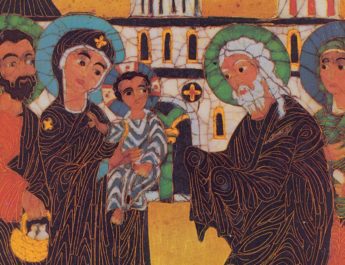1 Corinthians 15:35-38, 42-50
Ordinary C13
35 But someone will ask, “How are the deadA raised?B With what kind of bodyC do they come?”D
A “dead” = nekros. Perhaps from nekus (corpse). This is dead of lifeless, mortal, corpse. It can also be used figuratively for powerless or ineffective. It is where the word “necrotic” comes from.
B “raised” = egeiro. This is to awake, raise up or lift up. It can be to get up from sitting or lying down, to get up from sleeping, to rise from a disease or from death. Figuratively, it can be rising from inactivity or from ruins.
C “body” = soma. Perhaps from sozo (to save, heal, rescue); from sos (safe, well, rescued). This is body or flesh. It can be body in a literal or figurative sense (as the body of Christ). This is where the word “somatic” comes from.
D “come” = erchomai. This is to come or go.
36 Fool!E What you sowF does not come to lifeG unless it dies.H
E “fool” = aphron. 11x in NT. From a (not, without) + phren (diaphragm, heart, intellect, understanding; figurative for personal opinion or inner mindset; thought regulating action; sympathy, feelings, cognition); {perhaps from phrao (to rein in or curb)}. This is not having reason – foolish, unperceptive, unwise. It denotes short-sightedness and lack of perspective, which leads one to act without prudence. It is not grasping cause and effect, even willful ignorance. It implies being rash or egotistical.
F “sow” = speiro. Probably from spao (to pull or draw like one draws a sword). This is sowing a seed or scattering. It is sowing in a literal or figurative sense.
G “come to life” = zoopoieo. 11x in NT. From the same as zoon (literally a thing that is alive; so, an animal or living creature); {from zao (to live literally or figuratively)} + poieo (to make, do, construct, cause). This is to bring life to something, including something that was dead. This can also be to revitalize in a literal or figurative sense.
H “dies” = apothnesko. From apo (from, away from) + thnesko (to die, be dead). This is to die off. It is death with an emphasis on the way that death separates. It can also mean to wither or decay.
37 And as for what you sow, you do not sow the body that is to be,I but a bareJ seed,K perhapsL of wheatM or of some otherN grain.
I “be” = ginomai. This is to come into being, to happen, become, be born. It can be to emerge from one state or condition to another or is coming into being with the sense of movement or growth.
J “bare” = gumnos. 15x in NT. This is naked. Generally, it refers to someone who is not completely clothed i.e. only wearing the undergarment and not the complete attire for going out. Rarely, it can mean completely naked. It can be naked in a literal or figurative sense – open, bare, ill-clad. This is where “gymnasium” comes from.
K “seed” = kokkos. 7x in NT. This is seed or grain.
L “perhaps” = tugchano. 12x in NT. Root means to become ready. This word is to hit, meet, happen, obtain, chance, perhaps. Properly, it means to hit the mark or be spot on. Thus, it is the opposite of the Greek word for sin hamartano, which literally means to miss the mark.
M “wheat” = sitos. 15x in NT. This is used for any kind of grain that you can eat. It is usually wheat, but it can also be barley and other grains.
N “other” = loipos. From leipo (to leave behind, be lacking). This is the rest, remained, remnant, other, residue.
38 But GodO givesP it a body as he has chosen,Q and to each kind of seedR its ownS body.
O “God” = Theos. From Proto-Indo-European origins, meaning do, put, place. This is God or a god in general.
P “gives” = didomi. To give, offer, place, bestow, deliver. This is give in a literal or figurative sense.
Q “chosen” = thelo. This is to wish, desire, will, or intend. It is to choose or prefer in a literal or figurative sense. It can also mean inclined toward or take delight in. It can have a sense of being ready to act on the impulse in question.
R “seed” = sperma. Related to “sow” in v36. From speiro (see note F above). This is something sown so it could be seed or offspring and descendants. This is where the word “sperm” comes from.
S “own” = idios. This is something that belongs to you or that is personal, private, apart. It indicates a stronger sense of possession than a simple possessive pronoun. This is where “idiot” comes from (denoting someone who hasn’t had formal training or education and so they rely on their own understanding).
42 So it is with the resurrectionT of the dead. What is sown is perishable,U what is raised is imperishable.V
T “resurrection” = anastasis. From anistemi (to raise up, rise, appear; to stand up literally or figuratively. Can also mean to resurrect); from ana (upwards, up, again, back, anew) + histemi (to make to stand, place, set up, establish, appoint, stand by, stand still, stand ready, stand firm, be steadfast). This is literally standing up or standing again. It is used figuratively for recovering a spiritual truth. It can be raising up, rising, or resurrection.
U “perishable” = phthora. 9x in NT. From phtheiro (to destroy, corrupt, perish, waste away; figuratively, moral decay). This is destruction, corruption, or something perishable. It can be spontaneous decay or corruption inflicted on another in a literal or figurative sense.
V “imperishable” = aphtharsia. Related to “perishable” in v42. 8x in NT. From aphthartos (imperishable, undecaying, immortal, incorruptible); {from a (not, without) + phtheiro (see note U above)}. This is incorruptibility or indestructibility. So, figuratively, it is used to mean imperishable or immortal as one who is not subject to decay. Figuratively, this can also mean genuineness.
43 It is sown in dishonor,W it is raised in glory.X It is sown in weakness,Y it is raised in power.Z 44 It is sown a physicalAA body, it is raised a spiritualBB body. If there is a physical body, there is also a spiritual body.
W “dishonor” = atimia. 7x in NT. From a (not, without) + time (value, price, honor; honor as it is perceived by another or willingly granted by another; mark or respect, price, precious value, esteem, dignity); {from tio (to honor, pay respect to, value)} OR from tino (to pay a penalty or fine). This is dishonor or disgrace, shame, reproach, or common use. It is something that as seen as having no value.
X “glory” = doxa. From dokeo (to have an opinion, seem, appear, suppose; a personal judgment; to think); from dokos (opinion). This is literally something that evokes a good opinion – something that connects to our understanding of intrinsic worth. The ultimate expression of this is, of course, God and God’s manifestation. So, this is opinion, honor, and dignity, but also praise, glory, renown, and worship.
Y “weakness” = astheneia. From asthenes (without strength, sick, deprivation; weak in a moral or physical sense); {From a (not) + sthenes (strong, vigor); {from the base of sthenoo (to strengthen so that one can be mobile); from sthenos (strength)}}. This is weakness, frailty, illness, suffering, or calamity. It is any kind of sickness or injury that includes weakness or diminishes your ability to enjoy or accomplish what you would choose.
Z “power” = dunamis. From dunamai (to be able, have power or ability). This is might, strength, physical power, efficacy, energy, and miraculous power. It is force literally or figuratively – the power of a miracle or the miracle itself.
AA “physical” = psuchikos. 6x in NT. From psuche (breath, the breath of life, the self, individual, soul; that which makes a person unique – their identity, will, personality, affections; this isn’t the soul as the immortal part of us, but as our individuality; not life as a general concept, but specific to people); from psucho (to breathe, blow). This is natural, animal, sensitive, having the mind of the world. It relates to physical life and behavior. Pneumatikos is the highest of our natures and phusikos is the lowest of our natures (our animal side). Psuchikos is in between.
BB “spiritual” = pneumatikos. From pneuma (wind, breath, or ghost; a breeze or blast of air, a breath; figuratively, a spirit, the human soul or the part of us that is rational; also angels, demons, God, and the Holy Spirit); from pneo (to blow, breath, breathe hard). This is spiritual, spiritual people, or spiritual things – that which is ethereal or divine or religious.
45 Thus it is written,CC “The firstDD man,EE Adam,FF becameGG a livingHH being”;II
CC “written” = grapho. This is to write or describe. It is where the word “graphic” comes from.
DD “first” = protos. From pro (before, first, in front of, earlier). This is what is first, which could be the most important, the first in order, the main one, the chief.
EE “man” = anthropos. Probably from aner (man, male, husband) + ops (eye, face); {from optanomai (to appear, be seen); perhaps from horao (become, seem, appear)}. This is human, humankind. Used for all genders.
FF “Adam” = Adam. 9x in NT. From Hebrew Adam (Adam); from the same as adam (human, humankind, ruddy); from adam (to be red, red in the face). This is Adam.
GG “became” = ginomai. Same as “be” in v37. See note I above.
HH “living” = zao. Related to “come to life” in v36. See note G above.
II “being” = psuche. Related to “physical” in v44. See note AA above.
the lastJJ Adam became a life-givingKK spirit.LL 46 But it is not the spiritual that is first,MM but the physical, and then the spiritual.
JJ “last” = eschatos. Related to eschaton (end, last); perhaps from echo (to have, possess, hold). This is last, end, extreme, final. It is often used to discuss the end times, prophecies of the future, and the afterlife. The branch of theology focusing on all these topics is called “eschatology.”
KK “life-giving” = zoopoieo. Same as “come to life” in v36. See note G above.
LL “spirit” = pneuma. Related to “spiritual” in v44. See note BB above.
MM “first” = proton. Related to “first” in v45. From protos (see note DD above). This is firstly, before, in the beginning, formerly.
47 The firstNN man was from the earth,OO a man of dust;PP the secondQQ man is from heaven.RR
NN “first” = protos. Same as “first” in v45. See note DD above.
OO “earth” = ge. This is earth, land, soil, region, country, the inhabitants of an area.
PP “dust” = choikos. 4x n NT. From chous (earth, dust, soil); {from cheo (to pour)} OR from choos (dust, soil, earth, loose dirt, rubbish); {from cheimon (winter, storm); from the same as cheimazo (be storm-tossed, exposed to the winter chill); from chasma (chasm, gap, gulf); from chasko (to yawn)}. This is earthy – something that is made of dust, transient, passing, or dirty.
QQ “second” = deuteros. From duo (two, both). This is second, twice, again. It is part of where “Deuteronomy” comes from, which means “second law” or “a repetition of the law.” See https://en.wiktionary.org/wiki/Deuteronomy
RR “heaven” = ouranos. May be related to oros (mountain, hill) with the notion of height. This is the air, the sky, the atmosphere, and heaven. It is the sky that is visible and the spiritual heaven where God dwells. Heaven implies happiness, power, and eternity.
48 As was the man of dust, so are those who are of the dust; and as is the man of heaven,SS so are those who are of heaven. 49 Just as we have borneTT the imageUU of the man of dust, we will also bear the image of the man of heaven.
SS “heaven” = epouranios. Related to “heaven” in v47. 19x in NT. From epi (on, upon, what is fitting) + ouranos (see note RR above). This is heavenly, celestial, high, heavenly one, heavenly thins. It is the heavenly sphere in contrast to the earthly one, the place of spiritual activity. Figuratively, it can mean divine or spiritual. Properly, this describes that which is fitting from heaven’s perspective.
TT “borne” = phoreo. 6x in NT. From phero (to bear, bring, lead, make known publicly; to carry in a literal or figurative sense). This is to wear or bear regularly or continually. It can refer to clothing or bearing a burden.
UU “image” = eikon. From eiko (resemble, be like) OR perhaps related to eiko (to submit, give way, be weak, yield). This is a likeness such as an image, statue, or other representation. It implies a prototype that is being mirrored – a replication rather than a shadow. It can be an image in a figurative sense as well. This is where the word “icon” comes from.
50 What I am saying,VV brothersWW and sisters, is this: fleshXX
VV “saying” = phemi. From phao (to shine). This is to declare, say, or use contrasts in speaking to shed light on one point of view.
WW “brothers” = adelphos. From a (with, community, fellowship) + delphus (womb). This is a brother in a literal or figurative sense. It is also used of another member of the Church.
XX “flesh” = sarx. May be from saroo (to sweep, cleanse by sweeping); from sairo (to brush off). This is flesh, the body, human nature, materiality, kindred. Flesh is not always evil in scripture (as when it refers to Jesus taking on a human body). However, it is generally used in a negative way for actions made selfishly and not through faith. This can mean animal flesh, i.e. meat, or refer to body in contrast to soul/spirit. Flesh can be a way of talking about how things or people are related or talking about human frailty (physical or moral).
and bloodYY cannotZZ inheritAAA the kingdomBBB of God, nor does the perishable inherit the imperishable.
YY “blood” = haima. This is blood in a literal sense as bloodshed. Figuratively, it can also be used to refer to wine or to kinship (being related).
ZZ “cannot” = ou + dunamai. Dunamai is related to “power” in v4. See note Z above.
AAA “inherit” = kleronomeo. 18x in NT. From kleronomos (heir); {from kleros (lot, portion, heritage; that share assigned to you; also a lot used to determine something by fate, chance, or divine will); {perhaps from klero (casting a lot) or from klao (to break in pieces as one breaks bread)} + the same as nomos (what is assigned – usage, law, custom, principle; used for the law in general or of God’s law; sometimes used to refer to the first five books of the Bible or the entire Old Testament; also used to refer to theology or the practice and tradition of interpreting and implementing the law of God); {from nemo (to parcel out, assign)}}. This is to acquire or get by inheriting.
BBB “kingdom” = basileia. From basileus (king, emperor, sovereign); probably from basis (step, hence foot; a pace); from baino (to walk, to go). This is kingdom, rule, authority, sovereignty, royalty, a realm.
Image credit: “Tall Grasses Sunlit” by scott1346, 2018.




